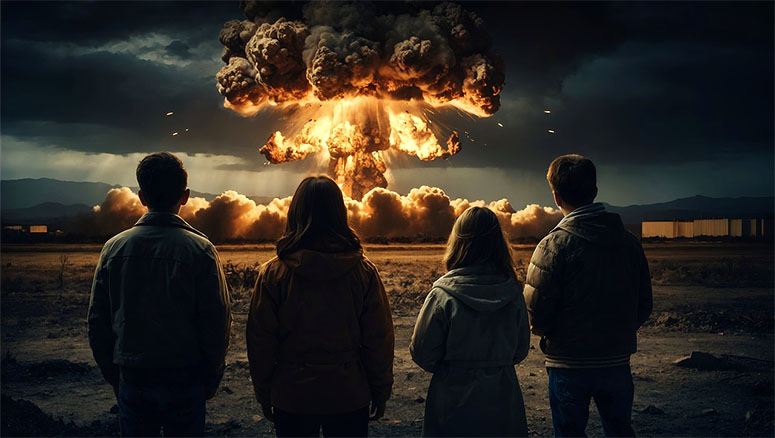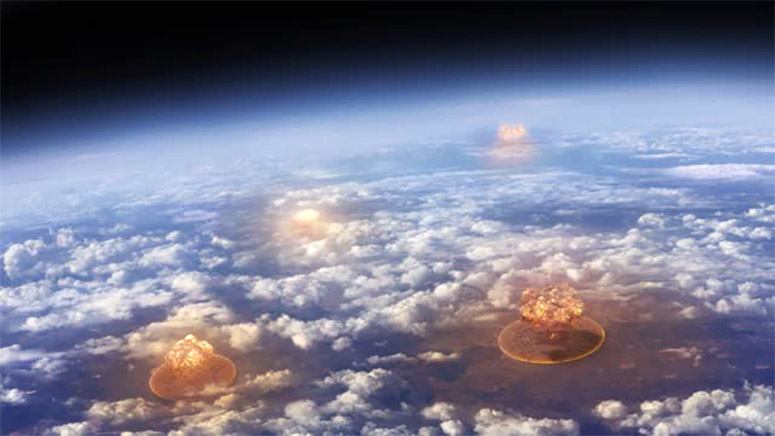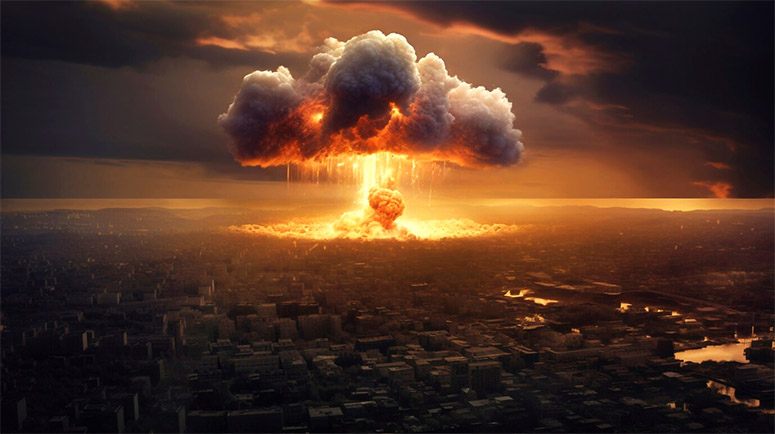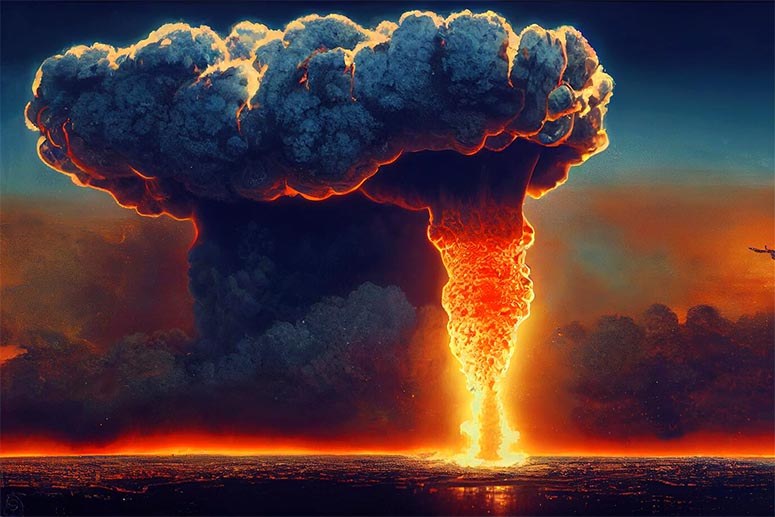Contents
As global tensions escalate and geopolitical landscapes evolve, the imminent threat of nuclear war emerges as an increasingly pressing concern.
This discourse seeks to define nuclear war while examining its underlying causes, including political conflicts, weapons proliferation, and the potential for miscommunication.
It further addresses the catastrophic consequences that may ensue, ranging from mass destruction to long-term health effects.
Additionally, the analysis includes historical precedents, current capabilities, and potential strategies for mitigating the risk of nuclear conflict. What are the odds of nuclear war?
This exploration is essential for understanding a critical issue that has far-reaching implications for the global community.
What is nuclear war?
Nuclear war is defined as a military conflict in which nuclear weapons are employed, representing one of the most catastrophic forms of warfare conceivable.
The potential for nuclear conflict has significantly influenced global politics and military strategies, especially during the Cold War era, marked by an arms race driven by geopolitical tensions among superpowers.
Currently, the presence of substantial nuclear arsenals constitutes an existential threat to humanity, prompting critical inquiries regarding the stability of international relations and the effectiveness of deterrence theory.
What are the causes of nuclear war?
The causes of nuclear war are complex and multifaceted, typically stemming from a combination of political tensions, weapons proliferation, and miscommunication among nations.
As geopolitical dynamics change, the risk factors associated with military conflicts increase, making it essential to implement effective crisis management strategies to reduce the likelihood of a nuclear confrontation.
Historical precedents indicate that misunderstandings and aggressive posturing can result in catastrophic consequences, highlighting the critical importance of diplomacy and international cooperation in preventing such outcomes.
1. Political tensions and conflicts
Political tensions and conflicts serve as significant catalysts for the risk of nuclear war, often arising from historical grievances, territorial disputes, and divergent foreign policy objectives.
These geopolitical tensions can exacerbate existing divides, prompting nations to form alliances that increase the potential for military confrontation.
The strategic interactions among regional powers often influence military strategies and can act as precursors to nuclear escalation during times of crisis.
In the contemporary landscape, the resurgence of long-standing rivalries, exemplified by the dynamics between NATO and Russia, illustrates how alliances can create a complex web that heightens the likelihood of miscalculation.
Historical instances, such as the Cuban Missile Crisis, underscore the catastrophic potential that can emerge from miscommunications in high-stakes diplomacy.
The nuclear ambitions of nations such as North Korea and Iran further complicate geopolitical dynamics, as their pursuits challenge established norms of non-proliferation and generate anxiety among neighboring states.
Understanding these factors is essential, as the alignment of military strategies and foreign policies can either mitigate or exacerbate the risk of nuclear confrontation.
2. Weapons proliferation
Weapons proliferation, particularly concerning nuclear capabilities, represents a significant threat to global security and increases the likelihood of nuclear conflict.
The dissemination of nuclear weapons to rogue states and non-state actors has raised concerns regarding escalation and the potential for catastrophic events, especially in regions characterized by instability.
Furthermore, the arms race mentality, driven by the pursuit of military superiority, exacerbates the risks associated with nuclear proliferation.
As nations endeavor to develop and uphold an arsenal that ensures their dominance, this resulting competition not only heightens tensions among established powers but also incentivizes less stable regimes to pursue their own weapons programs.
Such dynamics may lead to miscalculations, wherein countries could overestimate their adversaries’ intentions or capabilities, potentially igniting conflicts that could spiral beyond control.
The complexities inherent in security studies underscore the urgent necessity for effective arms control measures aimed at curtailing this perilous trend and fostering diplomatic solutions.
As global interdependence continues to grow, addressing these proliferation challenges has become essential for ensuring not only national security but also a more peaceful international landscape.
3. Miscommunication and human error

Miscommunication and human error have historically played pivotal roles in escalating conflicts towards nuclear war, frequently arising from flawed risk assessments or misunderstandings of intent.
The combination of high-stakes military readiness and the unpredictability of crisis scenarios can lead to rapid escalation based on incorrect assumptions or incomplete information.
This reality emphasizes the necessity of effective threat analysis and the establishment of robust communication channels between nuclear-armed states to prevent unintended consequences.
For instance, the notable 1983 Soviet nuclear false alarm incident illustrates how a single error, specifically a computer glitch, nearly triggered a catastrophic response.
Similarly, the 1995 Norwegian rocket incident almost resulted in a nuclear response when Russian military officials misinterpreted a scientific research rocket as a potential American attack.
Each of these events serves as a stark reminder that the intersection of human judgment and technological systems in the domain of nuclear security must be meticulously managed.
Establishing clear protocols and adopting sophisticated communication strategies can significantly mitigate these risks, ensuring that nations can navigate crises without the looming threat of disaster.
What are the consequences of nuclear war?
The consequences of nuclear war are profoundly devastating and far-reaching, resulting in mass destruction, significant loss of life, and long-term humanitarian impacts that extend well beyond the immediate effects of nuclear fallout.
The catastrophic risks associated with nuclear warfare encompass not only the destruction of infrastructure and civilian populations but also severe economic repercussions that can destabilize entire nations and regions.
An understanding of the potential outcomes of nuclear conflict is essential for promoting peace and security on a global scale.
1. Mass destruction and loss of life
Mass destruction and loss of life represent the most severe consequences of nuclear war, possessing the capacity to obliterate entire cities and decimate civilian populations within moments.
The deployment of nuclear weapons results in immediate fatalities due to blasts and radiation exposure, along with long-term humanitarian impacts that encompass widespread injury, psychological trauma, and the displacement of survivors.
A comprehensive understanding of these devastating repercussions is essential for advocating against nuclear conflict.
Historical precedents established by events such as the bombings of Hiroshima and Nagasaki demonstrate the catastrophic outcomes of nuclear warfare.
These incidents revealed the harrowing realities of mass casualties and the enduring effects of radiation sickness, which devastated communities and left scars that persisted for decades.
Contemporary analyses indicate that even a limited nuclear exchange could result in millions of deaths and a humanitarian crisis of unprecedented magnitude, as essential services collapse and resources become severely depleted.
As global tensions escalate, the urgency to address the implications of nuclear weapons becomes increasingly critical, underscoring the moral imperative to protect civilian populations from this grim potential.
Understanding these factors is essential, as the alignment of military strategies and foreign policies can either mitigate or exacerbate the risk of nuclear confrontation. So, what are the odds of nuclear war in today’s volatile international environment?
2. Environmental catastrophe
The prospect of nuclear war would result in a catastrophic environmental crisis, with nuclear fallout contaminating land and water resources, thereby disrupting ecosystems and agricultural practices.
The ecological repercussions of such a conflict would extend well beyond the immediate blast zones, potentially contributing to long-term climate change and altering weather patterns through a phenomenon commonly referred to as nuclear winter.
The implications for global security demand urgent consideration of the environmental stakes associated with nuclear conflict.
The radiation released during a nuclear incident could induce widespread genetic mutations in both plant and animal life, leading to a decline in biodiversity and potentially resulting in the extinction of vulnerable species.
This disruption could create imbalances within food chains, jeopardizing the survival of various organisms and compromising the health of entire ecosystems.
The effects of contaminated soil and water would have far-reaching consequences for agricultural systems, threatening food security not only in affected regions but potentially on a global scale.
Given these grave consequences, discussions surrounding nuclear disarmament and international peace must seriously consider the environmental ramifications, as the stakes for both humanity and the planet are unprecedentedly high.
3. Long-term health effects
The long-term health effects of nuclear war are substantial, with survivors potentially experiencing debilitating radiation sickness, severe mental health disorders, and the breakdown of healthcare systems due to the overwhelming number of casualties.
The psychological and physical impact on populations affected by nuclear conflict can persist for generations, resulting in public health crises that extend well beyond immediate medical responses.
Addressing these health challenges is crucial in the discourse surrounding nuclear warfare and its repercussions.
In the aftermath of such catastrophic events, the impact on healthcare infrastructures can be significant, as hospitals may become overwhelmed or non-operational, leaving many individuals without access to essential medical care.
Survivors may contend with chronic illnesses resulting from radiation exposure, including cancer and cardiovascular diseases, which further complicates the challenges faced by already strained healthcare systems.
The mental health repercussions, including post-traumatic stress disorder (PTSD) and anxiety, can impede community resilience and recovery initiatives.
It is increasingly imperative for public health policymakers to prioritize mental health services and ensure the availability of long-term health support programs. This focus will facilitate healing in affected populations and ultimately contribute to the more sustainable rebuilding of societies that have endured such devastating losses.
What are the chances of nuclear war?

The likelihood of nuclear war is influenced by a multitude of factors, including historical instances of conflict, the current nuclear capabilities of various nations, and the efficacy of deterrence theory in preventing escalation.
Analyzing past wartime scenarios reveals how geopolitical tensions can result in nuclear brinkmanship, emphasizing the necessity of comprehending both the probability and potential consequences of nuclear conflict in the contemporary global landscape.
Furthermore, monitoring the nuclear capabilities of countries is crucial for accurately assessing these risks.
1. Historical examples of nuclear war
Historical instances of nuclear conflict, particularly during the Cold War, offer essential insights into the complexities of military strategy and the potential for conflict escalation among states possessing nuclear capabilities.
The decisions made by political leaders during critical moments of crisis illustrate how geopolitical tensions can swiftly transition into considerations of nuclear engagement.
This underscores the necessity of understanding historical events to inform contemporary policy-making. Such precedents serve as cautionary reminders against the backdrop of increasing global tensions.
For example, the Cuban Missile Crisis starkly demonstrated the proximity of the world to nuclear confrontation, highlighting the imperative for effective diplomacy and robust communication channels to avert miscalculations.
Similarly, the bombings of Hiroshima and Nagasaki not only underscore the catastrophic consequences of nuclear weapons but also emphasize the critical need for strategies aimed at deterrence and conflict de-escalation.
These historical instances illuminate the delicate balance of power and highlight the potential repercussions that can arise when nations confront each other with military force and existential threats.
By examining these historical contexts, contemporary leaders can more effectively navigate today’s intricate geopolitical landscape and work towards mitigating the risks associated with nuclear proliferation.
2. Current nuclear capabilities of countries
The current nuclear capabilities of nations significantly influence the global security landscape and military preparedness, with established nuclear-armed states maintaining extensive arsenals and continuing advancements in tactical nuclear weapons.
A comprehensive understanding of the intricate dynamics surrounding nuclear capabilities is essential for security studies, as it informs arms control agreements aimed at preventing proliferation and ensuring strategic stability.
The presence of rogue states further complicates this delicate balance.
As nations persist in investing in and modernizing their nuclear arsenals, the geopolitical implications become increasingly evident.
Countries such as the United States, Russia, China, France, and the United Kingdom remain at the forefront of nuclear development, each striving to enhance their deterrence strategies while simultaneously participating in arms control negotiations.
In parallel, emerging powers, including India and Pakistan, are strengthening their nuclear capabilities within a regional context, which raises concerns regarding the potential for arms races.
The interplay between military readiness and international diplomacy is crucial, as nations seek to balance the reinforcement of their defenses with collaborative efforts to mitigate the risks associated with nuclear proliferation.
3. Efforts to prevent nuclear war
Efforts to prevent nuclear war underscore the significance of diplomacy, peace initiatives, and the establishment of nuclear treaties aimed at disarmament and non-proliferation.
International organizations play a crucial role in facilitating multilateral negotiations that address the risks associated with nuclear weapons proliferation and promote security frameworks designed to enhance strategic stability.
The effectiveness of these initiatives depends on the willingness of nations to engage collaboratively in conflict resolution.
A commitment to dialogue and mutual understanding is essential, particularly as geopolitical tensions continue to evolve.
The Treaty on the Non-Proliferation of Nuclear Weapons (NPT) serves as a cornerstone of international disarmament, offering a platform for nations to reduce their arsenals while simultaneously preventing the spread of nuclear capabilities.
Ongoing challenges persist, including the modernization of stockpiles and the emergence of new nuclear states that threaten established norms.
These complexities demand a renewed commitment to constructive diplomacy and comprehensive peace initiatives that address existing tensions while fostering a lasting climate of trust among global powers.
Given these considerations, it becomes imperative to ask: What are the odds of nuclear war? Understanding this question involves a thorough analysis of historical examples, current capabilities, and ongoing preventive efforts, providing a comprehensive perspective on the risks and necessary measures to ensure global security.
How can we decrease the odds of nuclear war?
Reducing the likelihood of nuclear war necessitates a comprehensive approach that emphasizes disarmament, proactive diplomacy, and effective conflict resolution strategies.
The incorporation of risk mitigation techniques into international relations can promote an environment of cooperation among nuclear-armed states, thereby decreasing the chances of miscommunication, which frequently serves as a precursor to escalation.
Engaging in open dialogue and establishing robust communication channels are critical elements in achieving this objective.
1. Disarmament and non-proliferation agreements

Disarmament and non-proliferation agreements serve as the fundamental framework for global initiatives aimed at preventing nuclear warfare.
These agreements establish protocols for the reduction of nuclear arsenals and the cessation of the proliferation of nuclear weapons.
Prominent treaties, including the Treaty on the Non-Proliferation of Nuclear Weapons (NPT), are supported by international organizations dedicated to fostering diplomatic engagement and arms control.
The efficacy of these agreements is contingent upon the cooperation and compliance of all participating parties.
These treaties not only enhance transparency among nations but also cultivate a climate of trust, which is essential for the maintenance of peace.
The roles of organizations such as the United Nations and the International Atomic Energy Agency are crucial in monitoring adherence to the agreements and facilitating negotiations.
By emphasizing the significance of dialogue and collaboration, these treaties establish a cohesive stance against the potential threats posed by nuclear proliferation, thereby bolstering global security.
They provide a foundational basis for broader disarmament efforts, contributing to a more stable international environment in which nations can collaborate to tackle other critical security challenges.
2. Diplomacy and conflict resolution
Diplomacy and conflict resolution are essential for addressing the root causes of tensions that could potentially lead to nuclear war. Effective crisis management strategies play a critical role in mitigating these risks.
Engaging in peace initiatives and negotiations fosters mutual understanding and can assist in de-escalating situations that may otherwise escalate into military conflict.
The capacity to navigate complex geopolitical landscapes through diplomacy is vital for enhancing strategic stability.
In today’s interconnected world, the consequences of failing to promote dialogue are exceedingly significant. Diplomatic interventions can serve as preventative measures, often facilitating sustained peace and cooperation.
Historical examples, such as the Treaty on the Non-Proliferation of Nuclear Weapons and various arms reduction agreements, demonstrate how thoughtful negotiation tactics can successfully bridge divides.
Building trust and establishing backchannels allow parties to approach sensitive issues with an open mind, ultimately reducing the likelihood of misunderstandings that could lead to escalation.
By prioritizing these diplomatic efforts, nations can create a safer global environment, ensuring that constructive conversations take precedence over destructive actions.
3. Education and awareness
Education and awareness are crucial in reducing the likelihood of nuclear war, as an informed public can significantly influence policymakers and advance nuclear security initiatives.
What are the odds of nuclear war? By fostering a comprehensive understanding of the risks associated with nuclear weapons and the necessity of disarmament, communities can advocate for proactive measures that prioritize peace and security.
Engaging citizens in discussions concerning nuclear issues is essential for cultivating a culture of awareness and advocacy.
Through educational programs, workshops, and community discussions, individuals can develop a deeper understanding of the implications of nuclear proliferation and the importance of global cooperation in addressing these threats.
This grassroots knowledge not only enables citizens but also exerts pressure on political leaders to take meaningful actions towards nuclear disarmament and the establishment of more stringent security policies.
When individuals are informed about the potential consequences of nuclear conflict, they are more likely to engage actively in advocacy efforts, supporting measures that promote international dialogue and conflict resolution.
This active participation ultimately contributes to shaping a future that prioritizes the safety and well-being of all.
Further down the page, you can find our FAQ on the likelihood of nuclear war.
Explore the fascinating world of probabilities and rare events. Satisfy your curiosity and uncover more intriguing topics at WhatAreTheOddsOf.NET.



